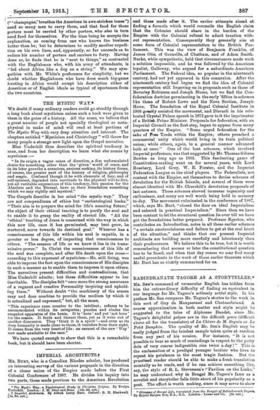THE MYSTIC WAY.* WE doubt if many ordinary readers could
go steadily through a long book about mysticism unless such a book were given to them in the guise of a history. All the same, we believe that a great number of people not specially theological or meta-
physical in make of mind will read at least portions of The Mystic Way with very deep attention and interest. The -chapters entitled "Mysticism and Christology " will throw for many people a strange new light upon the Gospel narrative.
Miss Underhill thus describes the spiritual tendency in man, and from her description we learn what she means by mysticism :—
" In its origin a vague sense of direction, a dim nnformulated desire for something other than the given' world of sense, and in its later growths a conscious, anxious seeking, its history forms, of course, the greater part of the history of religion, philosophy and magic. Confused though it be with elements of fear, and of self-interest, degraded into servitude to the physical will-to-live, yet all veritable expressions of this tendency, this passion for the Absolute and the Eternal, have as their foundation something which we may rightly call mystical."
The Gospels describe in her mind "the mystic way." They are not compendiums of ethics but "eschatological books." " Their aim is to prepare the mind for life's amazing future," the object of their ethical teaching is to purify the soul and
to enable it to grasp the reality of eternal life. "All the 'ethical' teaching of Jesus is concerned with the way in which this new life, once it has germinated, may best grow, be aturtured, move towards its destined goal." Whoever has a consciousness of this life within his soul is capable, in a greater or less degree, of imparting that consciousness to others. "The essence of life as we know it lies in its trans- missive power." In Christ the consciousness of this life of the soul was complete, and after His death upon the cross— according to this exponent of mysticism—He, still living, was able to impress the fact upon the consciousness of His disciples in such a manner as to enable them to impress it upon others. 'The narratives present difficulties and contradictions,- that Miss Underhill admits; but these difficulties -appear to her inevitable. The disciples felt "once more the strong assurance of a regnant and creative Personality inspiring and uphold- ing them." Without doubt "the machinery of the senses may and does combine to provide the medium by which it is actualized and expressed," but, all the same,
"This experience runs counter to the intellect ; refuses to be accommodated within its categories; puzzles and eludes the snapshot apparatus of the brain. It is 'here' and yet 'not here' for the senses. It feeds and blesses them, yet as it were out of another dimension. They think it is a spirit '—and even as its deep humanity is made clear to them, it vanishes from their sight. It comes from the very heart of life : an earnest of the new Way' now made available to the race."
We have quoted enough to show that this is a remarkable book, but it should have been shorter.










































 Previous page
Previous page